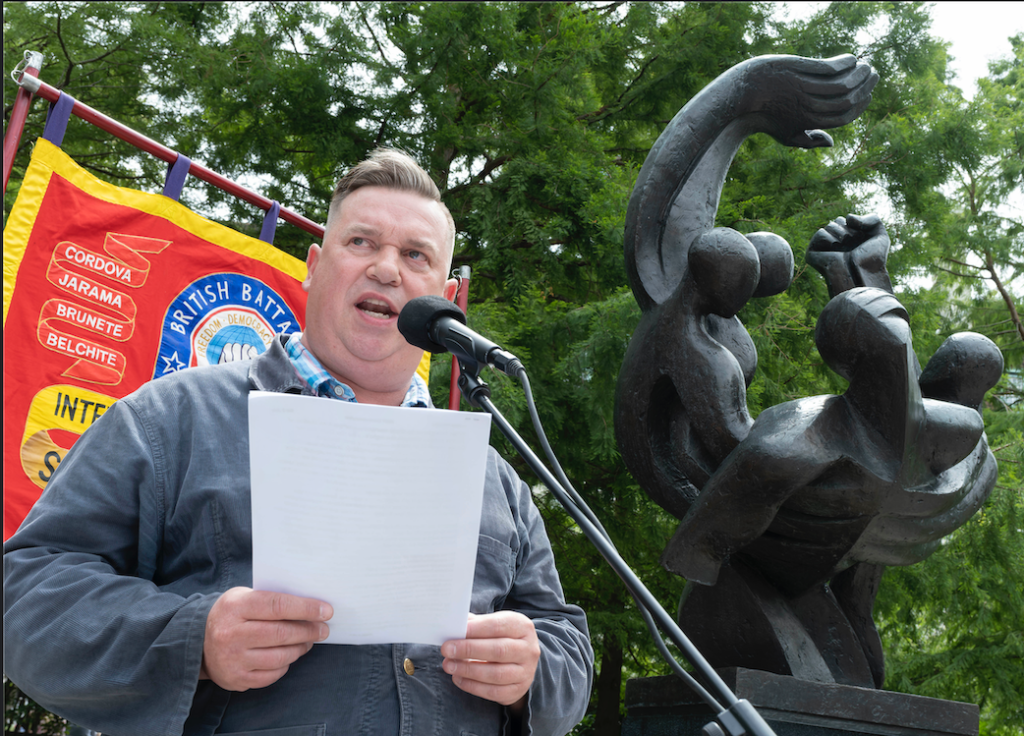International Brigade Memorial Trust
RMT President and IBMT Trustee Alex Gordon was an honoured guest speaker at the IBMT’s 2022 annual commemoration on Saturday 2 July. He spoke about the railway workers and merchant seamen who joined the International Brigades and their political legacy in the labour movement.

Good afternoon to everyone attending today’s IBMT annual commemoration!
I bring solidarity greetings from RMT General Secretary Mick Lynch and my union’s National Executive Committee to this celebration of the 15th International Brigade volunteers organised by the International Brigade Memorial Trust here beside Ian Walters’ sculpture in Jubilee Gardens on London’s South Bank.
I am grateful to Jim Jump, Megan Dobney and the Trustees of the IBMT for the invitation to address this year’s commemoration of the International Brigades volunteers. If you are not already an IBMT member – a wonderful organisation founded to celebrate and commemorate the women and men from these islands who volunteered to defend the Spanish Republic against the fascist forces that came to crush their democracy in 1936 – then please take this opportunity today to join us.
In the entrance lobby of Unity House – RMT’s head office near London’s Euston Station – is a plaque bearing the names of 113 former members of the National Union of Seamen and the National Union of Railwaymen – our forebear unions.
Since that plaque was unveiled in June 2004 by the late, great Jack Jones, the then-President of the International Brigades Association, the names of several other volunteers from our unions who joined the 15th International Brigade have come to light. So, the total number of NUS and NUR members who volunteered to fight in Spain because – in the words of the poet Cecil Day-Lewis, as inscribed on the Jubilee Gardens memorial, their ‘open eyes could see no other way’ – numbered over 120.
They were Able-Bodied Seamen (like Otto Estensen, who joined the National Union of Seamen, Middlesbrough branch in 1925 at the tender age of 15). They were railway engineers, workshopmen, trackworkers – railwaymen of all descriptions.
My union is proud to honour them. RMT is also proud to be affiliated to the IBMT and of the tremendous work IBMT continues to do to commemorate our members and the other volunteers who came from such a wide diversity of backgrounds. The work of the IBMT in recording our history is particularly important at this time when historical revisionism has become a veritable industry in academia and the mass media.
We rely on the IBMT and other truth-tellers to remind us, and you, that the International Brigades volunteers from these islands were forced to travel to Spain clandestinely and with considerable difficulty, because the official policy of the Tory government in Britain in 1936 was appeasement of fascism, dressed up with the euphemism ‘Non-Intervention”.
In reality, the faction of the Tory party that controlled British foreign policy in 1936 sought an accommodation with Hitler, Mussolini and their fascist allies; an accommodation that allowed Italy to invade Ethiopia and German and Italian troops to support Franco’s coup in Spain while permitting Britain to maintain its global Empire. The volunteers of the 15th International Brigade who we commemorate today were challenging the state policy of those politicians who two years later would become known as ‘the men of Munich’.
We also celebrate the fact that the commitment to the cause of democracy of these International Brigade volunteers began long before the Spanish Civil War broke out and continued long after the civil war ended.
To give just one example, Jim Prendergast (who died in 1974) was a communist, civil rights activist and leading figure in the National Union of Railwaymen. Jim joined the Irish section of the International Brigades, wrote for the Daily Worker (today’s Morning Star newspaper) and later founded the Connolly Association in 1938 to support Irish immigrants in Britain and was editor of the newspaper Irish Freedom. Jim worked with the scientist JBS Haldane on developing diving equipment for British military and Special Forces in the second world war and later became a rear gunner in Wellington bombers, the most dangerous position in the RAF.
In 1966, as Secretary of the Marylebone branch of the National Union of Railwaymen Jim Prendergast led a successful campaign to end racial segregation (the ‘colour bar’) in British Rail. One of his NUR branch members, a guard named Asquith Xavier, was refused promotion on the grounds that he was a black man. Jim marched his members out of Marylebone station and down the Euston Road to confront the Executive Committee of the NUR in their then headquarters opposite Euston Station.
Unsatisfied with the response from the union, Jim then went to the Daily Mirror who led with the story of Britain’s shameful racist employment practices. The British Railways Board promptly retreated and appointed Asquith Xavier as an Intercity Guard at Euston – the position he had applied for. Jim’s combination of clarity of analysis and direct action forms part of the legacy of the International Brigades that we celebrate here today.
To conclude I want to return to Cecil Day Lewis’ poem ‘The Volunteer’.
The Volunteer
Tell them in England, if they ask
What brought us to these wars,
To this plateau beneath the night’s
Grave manifold of stars –
It was not fraud or foolishness,
Glory, revenge, or pay:
We came because our open eyes
Could see no other way.
There was no other way to keep
Man’s flickering truth alight:
These stars will witness that our course
Burned briefer, not less bright.
Beyond the wasted olive-groves,
The furthest lift of land,
There calls a country that was ours
And here shall be regained.
Shine on us, memoried and real,
Green-water-silken meads:
Rivers of home, refresh our path
Whom here your influence leads.
Here in a parched and stranger place
We fight for England free,
The good our fathers won for her,
The land they hoped to see.
Posted on 7 July 2022.
